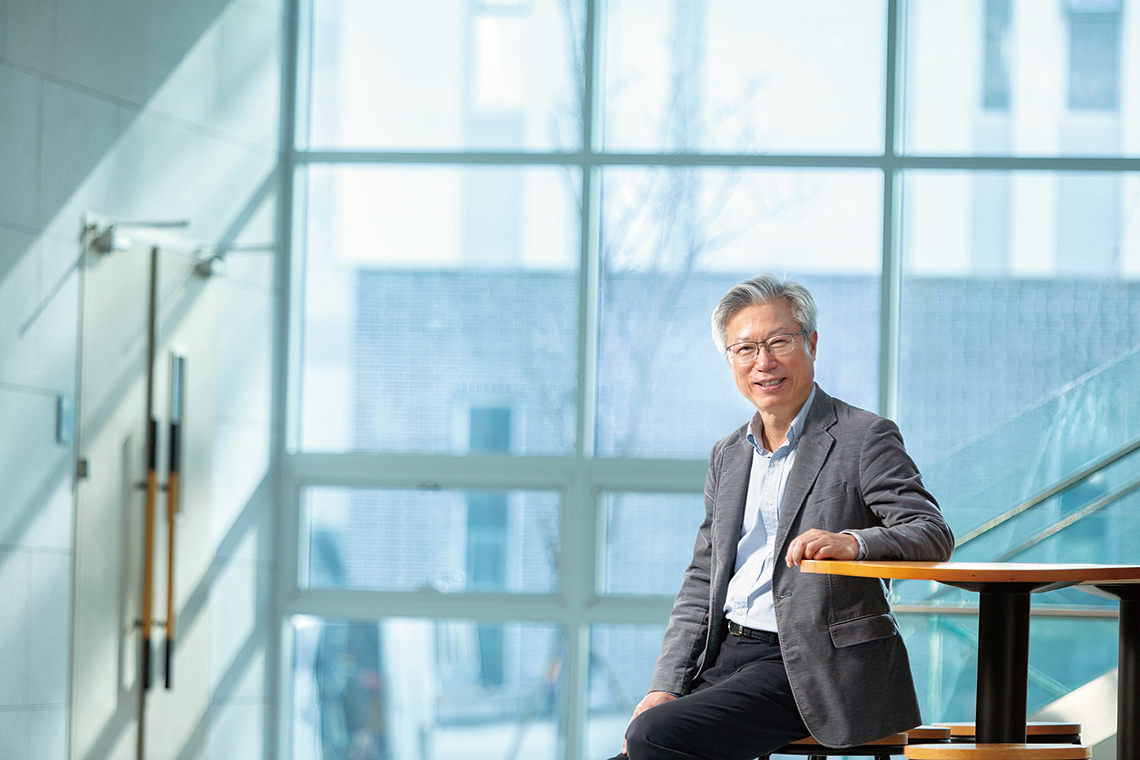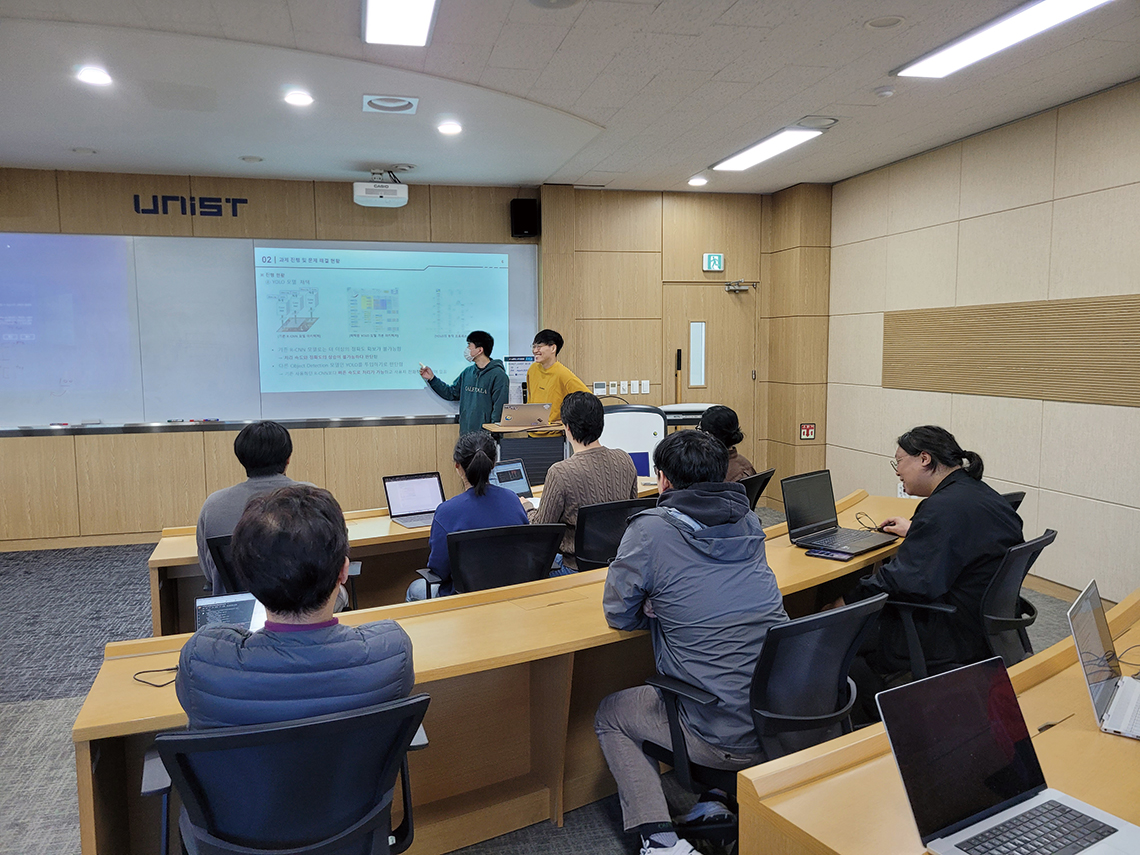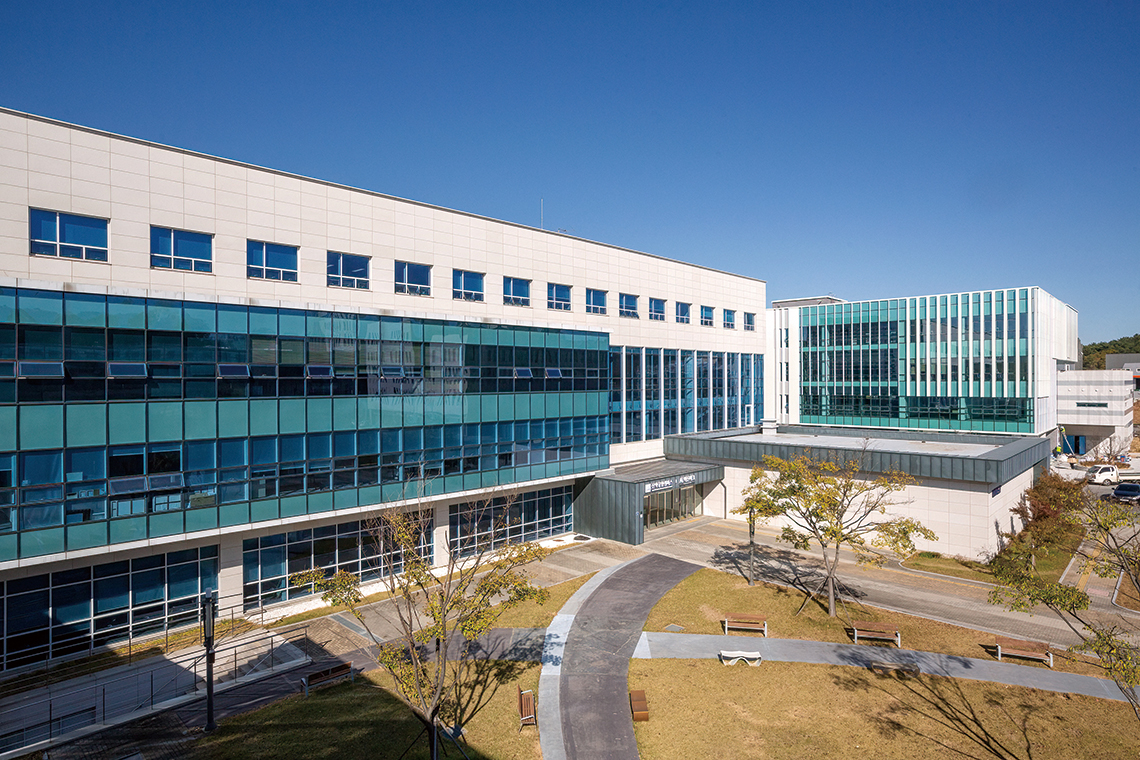
- Answer 2
- An artificial intelligence ecosystem created by UNIST
AI Innovation Park
본문영역
An artificial intelligence ecosystem created by UNIST
AI Innovation Park
Professor Kim Gyeong Won, Department of Industrial Engineering
(Executive Secretary of AI Innovation Park)
In 2019, UNIST designated artificial intelligence (AI) as its key research field, and decided that the solution to the resurgence of the southeastern region, including Ulsan, must also be found in AI. Accordingly, in 2021, the ‘AI Innovation Park’ was launched at the Industry-University Convergence Campus within the Techno Industrial Complex in Nam-gu, Ulsan, has been completing a difficult move. We met with Professor Kim Gyeong Won, who serves as the Executive Secretary of AI Innovation Park, and discussed the Park's achievements and future vision.

AI is essential for manufacturing-oriented industrial cities
AI contributes to improving productivity by solving problems that have been difficult to solve with human power alone until now, and is already widely pervasive in all fields of the economy and society, and even in our daily lives. It is also a standard for evaluating the level of the Fourth Industrial Revolution, and offers the most crucial competitiveness that will determine the future. Many countries around the world, including the United States, which is leading the field of AI, as well as China, European countries, and Korea, are competing against each other to develop relevant AI technologies. Professor Kim Gyeong Won emphasized that AI technology is especially essential for manufacturing-oriented industrial cities in the southeastern region including Ulsan.
“Traditional manufacturing technologies such as shipbuilding, automobiles, and petrochemicals have now reached their peak. By themselves, there are no room for further development. In addition, as a large number of the baby boomers and skilled technicians of that era, who led the growth of the manufacturing industry in the past, are reaching their retirement age, technological disconnection and manpower shortages are becoming more problematic. Convergence with AI is absolutely essential to innovate and regain competitiveness in manufacturing industry that has reached its limits.”
When UNIST launched the Graduate School of AI 2020, there were approximately 340 companies in Ulsan and the southeastern region that expressed interest in building cooperation with UNIST in the AI field. This example shows at a glance how great the industry’s concern and interest in AI are. Such desperation of the local industry was a major factor behind the launch of AI Innovation Park.
Currently, two-thirds of the UNIST Industry-University Convergence Campus with a total floor area of approximately 9,917㎡ (3,000 pyeong) is used as the AI Innovation Park. It is equipped with comfortable classrooms and laboratories and childcare facilities for tenant companies. At the beginning of the project, a total of 3.5 billion KRW was invested, national and municipal funds together. Since its official launch in 2021, it has been carrying out it’s movements actively with the goal of building an AI innovation ecosystem in Ulsan and the southeastern region, upgrading key industries, and fostering new future industries. The key businesses of the AI Innovation Park are divided into three categories: education for industrial workers, industry-university cooperation research, and support for startups.

AI Innovation Park is building an AI innovation ecosystem by encompassing various industries”
Promoting integration of the entire cycle of “education-research-startup”
“AI Innovation Park is the window to share UNIST’s key AI-based capabilities with the industry. We are leading the nurturing of AI talent, advancing AI research capabilities, accelerating AI-based manufacturing innovation, and creating new AI-based businesses. The important point is to establish an AI ecosystem that integrates the entire cycle of “education-research-startup.” This is because education, research, and startup must be linked in a virtuous cycle in a larger framework to change the actual industry and create great synergy.”
When talking about AI education, most people think of education for job seekers, but AI Innovation Park has developed and is operating the “AI Novatus Academia” course for employees of small and medium-sized enterprises (SMEs). In order to solve problems at work sites by applying AI to existing manufacturing technologies, you must know the field well more than anything else. Meanwhile, in the case of SMEs in real life, even if they desperately feel the need for AI, they face difficulties due to lack of manpower, costs, and systems. In order to solve these problems at once, AI Innovation Park designed an education course for employees of SMEs. Over the past three years, they have trained 180 people from 85 companies in Ulsan, a total of 283 people from 157 companies including the Gyeongsangnam-do region, as AI experts in the industrial field. Until this year, sixth graduates in the Ulsan region and fourth graduates in the Gyeongsangnam-do region were produced successfully.
“Classed are held every Friday for eight hours. The curriculum consists of two months of theoretical training and three months of practical training. The biggest differentiation of “AI Novatus Academia” is in its educational method. Project-Based Learning (PBL)-style practices are held. Simple theoretical and coding training alone cannot secure the capabilities that companies need. In order to embody the AI problem-solving capabilities, you need to directly solve real-life problems in the corporates’ field.”
Professor Kim Gyeong Won explained that only about 20% of the knowledge gained through theoretical training can actually be used for solving problems in the field. There are many more factors that can be determined by knowing the field work well, such as which AI model is best suited, and what data will be mainly used. Therefore, PBL-style practice can be said to be the essence of training AI experts. For each term, about 10 PBL assignments per group are carefully selected, and trainees must solve real-life problems in teams. To date, we have conducted 83 PBLs on 83 topics, accumulating various use-cases.

AI Innovation Park to enhance Korea’s AI capabilities
The impact of AI becomes even greater when it is converged with other fields. For this reason, AI Innovation Park conducts industry-university cooperation research in the form of “AI+X lab” that applies AI to various industrial technologies.
“We help SMEs innovate the productivity of key industries and foster new industries through AI. Research funding is provided at 100 million KRW per year for up to two years, with companies covering only 20% and UNIST covering the rest through government funds. So far, we have collaborated with various companies and developed process optimization AI, vision inspection AI, wearable AI, semiconductor material AI, and autonomous driving AI. We led this not only by corporate performances, but also achieved presenting an excellent SCI-level papers.”
From 2021 to present, industry-university cooperation research has been promoted here, 7 tasks have been completed, and 8 tasks are in progress. Professor Kim Gyeong Won selected the digital transformation of Samyang’s Ulsan Plant 1 as an exemplary case of AI+X lab’s industry-university cooperation research. By applying AI to a 70-year-old factory, the process that relied solely on manual work was largely transformed into an AI- and data-based process. Through this, production process troubles were reduced, and more than 1 billion KRW of annual economic benefit was achieved. ‘AI technology to detect impurities in the fish cake manufacturing process,’ developed through cooperation with Samjin Amook, is also noteworthy. It checks and detects defects of products through AI technology, which can be used for product inspection in various fields.
“In addition to supporting existing SMEs, we are also working to foster new industries. We have an incubating space to support startups specializing in AI in Ulsan. Currently, 12 startups moved in and are promoting growth through UNIST’s startup support program.”
One of the difficulties that AI startups face is manpower shortages. In order for a company to grow, it needs well-talented people, but it is not easy for startups. However, startups that move into the AI Innovation Park gain great strength by being able to recruit UNIST’s excellent students through internships, etc. and receive support from UNIST faculty.
“What makes AI Innovation Park unique is that it is supported by the key competitiveness of UNIST. At the UNIST Graduate School of AI, there are 28 professors specializing in AI field. With a large number of young faculty members with the highest level of competency in Korea, this facility can guarantee the highest quality in both education and research. AI Innovation Park has many cases of projects accumulated over the past three years. We would like to share more of these cases and promote synergy by holding AI communities or exchange meetings by region and industry.”
AI is an inseparable key factor in the innovation of existing industries and the discovery of new business models appropriate for the times. For the resurgence of Ulsan and the southeastern region, which has grown mainly in the traditional manufacturing industry, the role of AI Innovation Park will inevitably be large. The AI innovation ecosystem that the AI Innovation Park will build will contribute to enhancing the AI capabilities of not only the region but also Korea.

